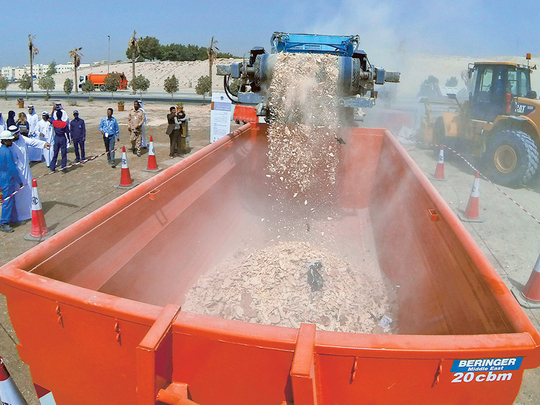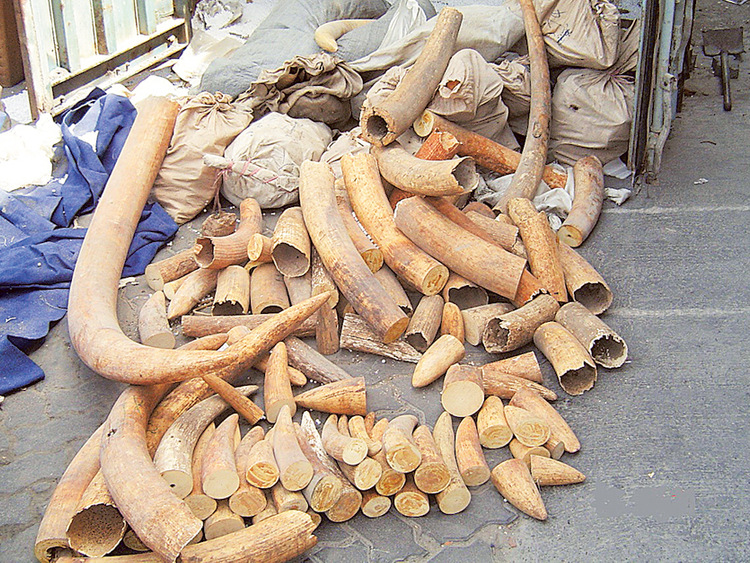
Dubai: By the time you finish reading this report, another elephant in Africa has been shot and mutilated, its tusks hacked off, before being left to suffer a slow and agonising death.
The "white gold", or ivory, that nature has endowed elephants in the form of specialised teeth, has doomed them to a brutal and cruel fate thanks to human greed that stops at nothing to possess the ivory.
The illegal wildlife trade generates an estimated US$19-billion a year, ranking fourth on the list of the most lucrative illegal activities in the world behind drugs, counterfeiting and human trafficking.
Poachers target to sell it in East Asia, passing through the UAE. This illicit trade is responsible for the recurring mass slaughter of elephants and this has to stop.
The UAE sent out this message to wildlife traffickers today as it crushed more than 10 tonnes of raw and crafted ivory seized through the years from its points of entry.
No official estimates were released as to the value of the ivory that was crushed.
“The value of a live elephant is higher than the worth of all the ivory that we see today,” Dr Rashid Ahmad Bin Fahd, Minister of Environment and Water, told Gulf News.
“Every year, more than 25,000 elephants are being killed just for [ivory]. So the UAE will do its utmost to prevent and stop such illegal trade and the harm done to elephants,” he added.
The African elephant (Forest and Savannah) is threatened, with less than 400,000 remaining worldwide, figures from World Elephant Day show. At the rate poachers are killing them — one African elephant is killed every 15 minutes — there will be no elephants left in the wild in the next decade.
There is no known market for ivory in the UAE but it is an important link as it is a transit point between Africa and East Asia.
Destroying the tusks, therefore, sends a strong message to wildlife traffickers that they have no chance of smuggling ivory through UAE, Bin Fahd said.
“The UAE will do its utmost to protect wildlife and also to take all the efforts against the illegal trade of wildlife,” Bin Fahd said.
In 2012 and 2013, Dubai Customs seized shipments containing 474 ivory tusks at Jebel Ali port. In 2014, authorities seized 301 pieces of ivory at Dubai International Airport. They also seized 1,500 ivory products and tusks from 2011 to 2014.
With these big confiscations, Dr Al Sayed Mohammad, Regional Director at International Fund for Animal Welfare — Middle East and North Africa, is noting a change in the trend.
“We have indications that after the big confiscations in 2012 and 2013, there have been no more confiscations that happened in Dubai but we found one confiscation in Riyadh,” Dr Mohammad told Gulf News.
“This gives us some indication that the smugglers are trying to find another route to reach the Far East [because they are thinking that] Dubai is already closed [as a transit point].”
Dr Mohammad admitted that while the crushing of the ivory would not bring the elephants back to life, it would play a role in combating wildlife trafficking.
“We would like traffickers, poachers and smugglers to know that there is no way to benefit from this ivory. We will not allow them to have this chance.”
Dr Mohammad said it is hard to estimate the number of elephants massacred for this amount of ivory. He said the elephant deaths would not only impact the herds but the entire biodiversity.
“This will only lead to the extinction of the elephant and elephants play a very important role in biodiversity. If the elephant becomes extinct, so will other species. The elephant is also a key factor in tourism in many African countries. So, if they disappear, many countries in Africa will lose one of their important economic resources,” Dr Mohammad said.
The UAE is the first Arab country to crush its ivory stocks, after the US, China, UK, France, among others.
The ministry retained a portion of the samples of ivory to be used for scientific research and awareness. The crushed ivory will be buried and disposed of in designated areas to prevent any form of reuse.
John E. Scanlon, Secretary-General of the Convention on International Trade in Endangered Species (CITES), to which the UAE is a signatory, said, “Today’s important event in Dubai serves to raise public awareness about the impacts of illegal elephant ivory trade and the determination of the United Arab Emirates and the global community to put an end to it.”













